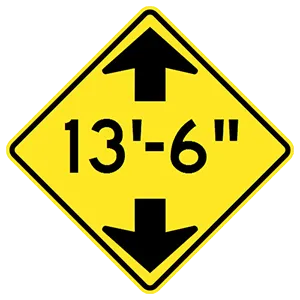Motorcycle Test | License NJ 2026 | FREE Online Practice! #14
Take this FREE motorcycle test (license in NJ 2026) to check your knowledge of the road rules. To improve your results, download a motorcycle handbook online, study theory, and practice for free on our website. Still worried about how to get a motorcycle license in New Jersey in 2026? Check our website for more sample tests, train as much as possible, and boost your grades!
1 . Switching to a lower gear is also known as:
Shifting to a lower gear causes an effect similar to using the brakes. For this reason, downshifting is also known as engine braking.
2 . This road sign means:

This sign warns that the overpass ahead has a low clearance. Do not proceed if your vehicle is taller than the height indicated (in this case, 13 feet, 6 inches).
3 . Where is the gearshift lever located?
The gearshift lever is located in front of the left footrest and is operated with the left foot.
4 . When slowing down or stopping, you must:
Shift down through the gears as you slow down or stop. Stay in first gear while you are stopped to ensure that you can move quickly if you need to.
5 . What may help if you experience slippage of your drive chain?
If you experience chain slippage, tightening the chain may help. If tightening the chain does not reverse the problem, replace the chain before continuing to ride your motorcycle.
6 . If you are using an unfamiliar motorcycle, what should you do before riding?
All motorcycles are slightly different, so you should check the controls and make sure you know the gear pattern before riding an unfamiliar motorcycle. Work the throttle, clutch, and brakes a few times prior to riding.
7 . Smoothly downshifting on motorcycles:
Engine braking by smoothly downshifting can be a useful option for motorcyclists. If you choose to engine brake, apply your brake lights separately to let other drivers know that you are slowing down.
See the exact questions that will be on the 2026 New Jersey DMV exam.
99.2% of people who use the cheat sheet pass the FIRST TIME
Jeneen was tired of paying $5/gallon. She got herself a scooter that required the motorcycle license. She studyed the motorcycle test cheat sheet and passed her test the next day!
Christopher tells us how he knew nothing prior to obtaining the motorcycle study guide, and he only got one question wrong because he clicked on the wrong answer by mistake.



